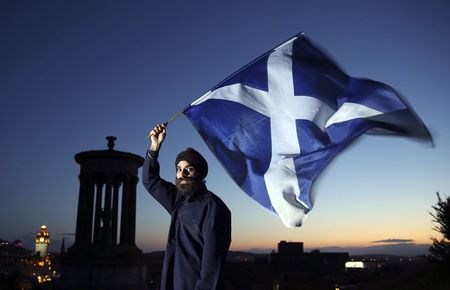LONDON (Reuters) - Support for Scottish independence has fallen following a TV debate this week and the campaign to split the United Kingdom will need a dramatic turnaround if it is to win a forthcoming referendum, a poll showed on Saturday.
The Survation poll for the Scottish Daily Mail newspaper said 50 percent of respondents planned to vote against independence in a ballot due on Sept. 18 that will decide whether Scotland breaks its 307-year union with England.
It was the highest level of support for remaining part of the United Kingdom in all Survation polls since February.
By contrast, just 37 percent said they planned to vote for a split while 13 percent said they were undecided. Excluding undecided voters, support for independence stood at 43 percent against 57 percent in favour of the union.
Chief Executive of Survation Damian Lowe told Reuters the 'yes' campaign would need to see a "seismic change" in order to win, and had to answer key questions, particularly over which currency an independent Scotland would use.
"I think they'll need to go back to the drawing board on some of these issues and come back with some answers," he said.
The last Survation poll, published on Aug. 3, showed support for independence at 40 percent, with 46 percent against and 14 percent of respondents undecided.
This latest survey capped a bad week for Scottish First Minister Alex Salmond, the head of the pro-independence camp who was widely seen to have lost Tuesday's debate with Alistair Darling, the leader of the campaign to keep Scotland in the UK.
During the televised clash, Salmond was repeatedly pushed on how an independent Scotland would keep the pound, given that the British government had excluded a currency union.
He responded on Saturday by saying there was "absolutely nothing" that could be done to stop Scotland from using the pound and there was no alternative plan.
"Plan B implies settling for what's second best," he said in an open letter published in The Scottish Sun newspaper.
"And neither myself, my colleagues in the SNP (Scottish National Party) or the wider Yes campaign will ever settle for second best for Scotland."
Although different surveys show varying levels of support for the "yes" campaign, none show it in the lead, with supporters of secession struggling to make any headway since the end of March.
Most commentators had predicted that Salmond, a powerful speaker, would notch up a rhetorical TV victory to breathe new life into his flagging campaign.
However, the Survation poll said 53 percent of voters thought Darling had won, with nearly a quarter saying it had made them more likely to vote 'no' to independence. Just 28 percent thought Salmond had come out on top.

Survation polled 1,100 people in Scotland aged over 16 years old on Aug. 6 and 7.
(Reporting by Costas Pitas; Editing by Crispian Balmer)
